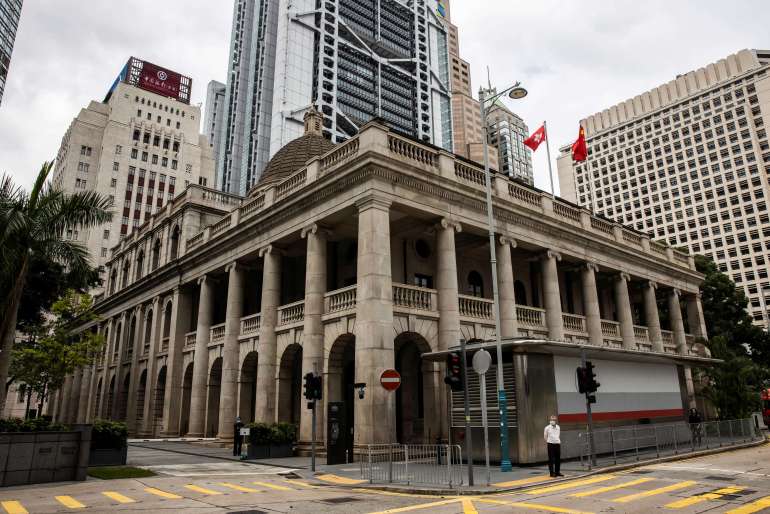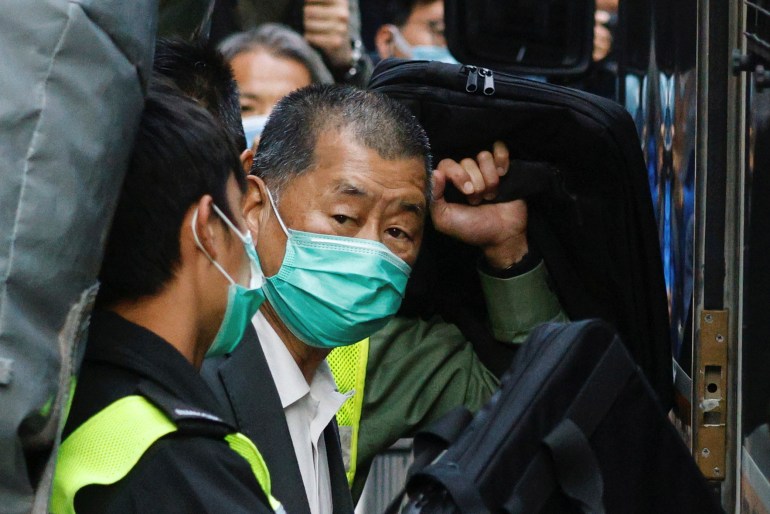Taipei, Taiwan – Closing arguments are as a consequence of start in Hong Kong on Wednesday within the high-profile trial of 16 pro-democracy activists and legislators, greater than 1,000 days after they had been arrested by nationwide safety police.
Ten days have been put aside for prosecutors and defence attorneys to summarise their arguments within the case in opposition to the 16, who’re amongst 47 pro-democracy figures arrested on fees of conspiracy to commit subversion in pre-dawn raids in January 2021.
If convicted, they face a most sentence of life imprisonment.
The high-profile case has been marked by repeated delays, drawing worldwide criticism, with a lot of the defendants remanded in custody for practically three years after being denied bail.
The trial, which was predicted to final 90 days, has dragged on for practically 10 months as three nationwide safety judges – handpicked by the federal government – wade by way of hundreds of pages of proof offered by the defence and prosecution.
Hong Kong prosecutors allege that the 47 violated town’s sweeping nationwide safety laws by organising an unofficial election main in July 2020 as a part of a plot to achieve a majority within the semi-democratic legislature and veto the federal government’s funds payments.
Among the many group, 31, together with outstanding activist Joshua Wong, former legislator Claudia Mo, and authorized scholar Benny Tai, have pleaded responsible and are awaiting sentencing.
“Delayed justice is injustice and repeated delays or postponement of trials particularly in [national security] cases reflects that the prosecution has not done a good job in managing these cases,” Eric Lai, a analysis fellow at Georgetown Heart for Asian Regulation, informed Al Jazeera.

Whereas the “Hong Kong 47” case is the biggest nationwide safety case up to now, drawn-out proceedings have change into a characteristic of town’s British-inherited authorized system for the reason that imposition of the nationwide safety regulation following anti-government protests in 2019.
Though Hong Kong retained its frequent regulation authorized system after town’s return to China in 1997, the nationwide safety regulation weakened or scrapped many frequent regulation norms, together with the presumption in favour of bail and the correct to a jury trial.
The variety of individuals in Hong Kong prisons on remand – these in detention whereas awaiting trial or sentencing – jumped from 2,044 to three,304 individuals between December 2018 and September 2023, in line with knowledge collected by the Hong Kong Correctional Companies Division.
As a share of circumstances, the share of these in remand grew from 24.98 p.c to 37.24 p.c over the interval.
A lot of the backlog stems from some 3,000 prosecutions that adopted the 2019 protests, when greater than 10,000 individuals had been arrested and charged for offences comparable to illegal meeting, possession of an offensive weapon, legal harm and assaulting a police officer, in line with knowledge compiled by the Georgetown Heart for Asian Regulation.
Prosecutions of protest-related circumstances have usually taken 30 p.c longer than different legal circumstances, in line with an evaluation by the Georgetown Centre, with 41.8 p.c taking greater than a 12 months to finish as of August 2022 – consuming up court docket time and assets.
“The number and proportion of people in [Hong Kong] jails who have not been convicted are both at record highs. There is a known shortage of judges in [Hong Kong] courts, which along with thousands of protest-related cases may have caused backlogs in trials,” David Webb, a former funding banker who maintains a 23-year database on the variety of individuals in custody, informed Al Jazeera.
“There is also a tendency to deny bail pending trial in protest-related cases, stemming from a presumption against bail in the National Security Law which has also been applied to non-NSL cases.”
Hong Kong’s courts are going through a rising scarcity of judges, with practically one in 4 judicial posts presently vacant amid complaints of low pay and a broader mind drain for the reason that COVID-19 pandemic.
Victor Dawes, the chairman of the Hong Kong Bar Affiliation, earlier this 12 months warned that proposals by some US lawmakers to sanction judges that hear nationwide safety circumstances may make it much more troublesome to recruit expertise.
Hong Kong Chief Govt John Lee has hinted that “significant national security trials” may in the future transfer to Beijing if sanctions have an effect on court docket proceedings.
As of August, 264 individuals have been arrested by nationwide safety police and 148 charged beneath the nationwide safety regulation or the colonial-era offence of sedition, in line with analysis by Lai and others printed by ChinaFile.
Of those, 103 have been convicted and 45 are nonetheless on trial. None has been acquitted.

Different high-profile delays embody the case of Jimmy Lai, the founding father of the shuttered pro-democracy newspaper Apple Every day, whose nationwide safety trial is because of start on December 18, a 12 months after it was first scheduled.
Lai, 75, has been detained since December 2020, first in pre-trial detention after which beneath a five-year sentence for fraud. He may spend the remainder of his life in jail if discovered responsible of nationwide safety offences.
The trial of Chung Pui-luen and Patrick Lam, two editors of the now-defunct digital information outlet Stand Information, has additionally confronted delays because it started in October 2022.
Throughout the trial, defence attorneys accused the prosecution of improperly submitting some 1,500 pages of undeclared proof, inflicting additional delays.
The Stand Information verdict just isn’t anticipated till subsequent 12 months because the court docket considers the impression of a UK Privy Council ruling over a separate sedition case in Trinidad and Tobago, one other frequent regulation jurisdiction, which discovered sedition should embody “an intention to incite violence or disorder.”
In contrast to different delays, the deferral in that case could also be a uncommon glimmer of fine information, in line with Georgetown’s Lai, because it “shows that the local courts are still eager to respect the whole common law system”.
“It will be a long process but at the same time it also shows the court has to consider the latest development on how the common law courts worldwide consider the offence of sedition,” Lai stated.

